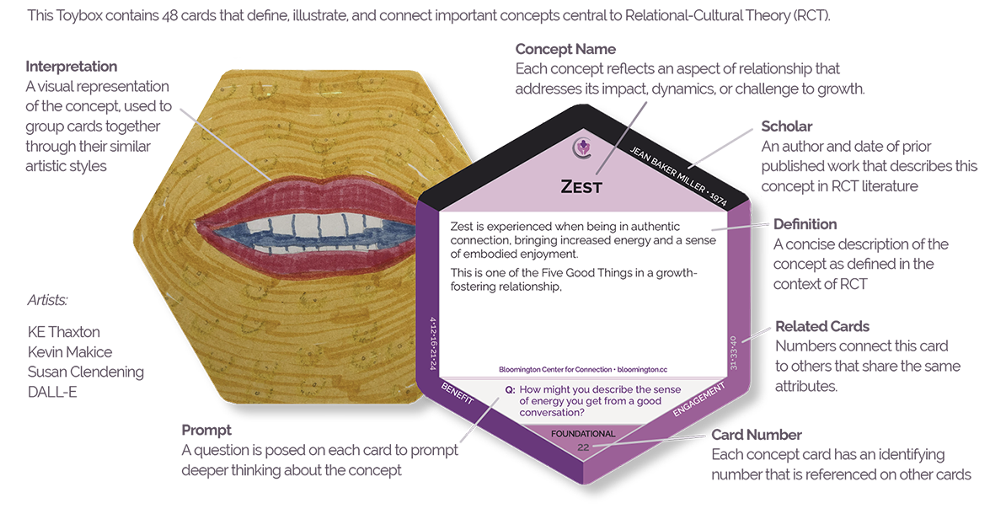


RCT Toybox - 2022 Deck
Requirements
Description
RCT Toybox
This is an earlier version of the RCT Toybox deck. The newest update (2024) is now available.
48 concept cards about growth in connection
The RCT Toybox is a deck of 48 cards that define, illustrate, and connect important concepts central to Relational-Cultural Theory (RCT). RCT concepts were originally conceived by founding and continuing scholars at the International Center for Growth and Connection, the Jean Baker Miller Training Institute, Wellesley’s Stone Center, and Monday nights in the living room of Miller’s home.
RCT Toybox cards are designed to provide both an overview of each concept and ways to connect them to other concepts.

How To Use the Toybox
The RCT Toybox is intended to be a tangible way to learn & explore important ideas about relationships & the cultures that influence them. There is no right way to use this card deck, but here are some ideas to prompt deeper thinking about RCT concepts.
Storytelling
Choose three cards at random, and use them to tell a story about yourself or a relationship. Consider the order the cards are played and how these concepts are related to each other.
Storytelling can be done with a particular challenge, event, or relationship in mind, or by allowing the cards themselves prompt memories & discussion of desired outcomes. When telling a story shared with someone else, draw three cards each and take turns playing and discussing each card until one person runs out.
Card Sorting
Intentionally choose five starter concepts at random from the Toybox, and spread the selected cards in front of you. Stack the rest of the cards into a deck.
One at a time, choose the top card from the deck and place it near one of the five starter cards that you believe to be most strongly related to that new concept. When all cards are played, label each group and try to identify a situation in your life where these concepts resonate.
Variation A: Intentionally select starter cards because they are the most challenging for you to understand or implement.
Variation B: Instead of starting with concepts, write six categories on pieces of paper, such as:
- Important To Me
- Not Important to Me
- Might Be Important To Me
- More Important Than I Want
- Should Be More Important
- Uncertain
Dominoes
Choose one card at random and place it in the center of a table. Spread the rest of the cards around the periphery, leaving the first card well-isolated.
Find a concept that you feel is related to the central concept, and place its card next to the first by touching one of its available sides. Find another concept that relates to either of the first two played, connecting that card to any available side. To play a card, a concept must be related to every card it touches. If you are playing with other people, take turns selecting and playing cards. When all cards are gone, name each arm or cluster to represent the concepts in that part of the connected structure.
Resources
For more information about these and other RCT concepts:
- Toward a New Psychology of Women (1976) Jean Baker Miller
- Women’s Growth in Connection (1991) Alexandra Kaplan, Irene P. Stiver, Judith V. Jordan, Janet Surrey, Jean Baker Miller
- The Healing Connection (1997) Jean Baker Miller and Irene Stiver
- Women’s Growth in Diversity (1997) edited by Judith V. Jordan
- The Complexity of Connection (2004) Judith Jordan, Linda Hartling, Maureen Walker
- How Connections Heal (2004) edited by Maureen Walker and Wendy Rosen
- The Power of Connection: Recent Developments in Relational Cultural Theory (2008) edited by Judith V. Jordan
- Relational Cultural Therapy, 1st edition (2009), 2nd edition (Norton Theories of Psychotherapy Series) (2018) Judith V. Jordan
- Wired to Connect: The surprising link between brain science and strong healthy relationships (2016) Amy Banks
- Transforming Community (2017) Connie Gunderson, Dorothy Graff, Karen Craddock
- Connected Teaching (2019) Harriet Schwartz
- When Getting Along Is Not Enough: Reconstructing Race in our Lives and Relationships (2019) Maureen Walker
Components
| Component | Quantity | Photo |
|---|---|---|
| {{item.name}} | {{item.quantity}} |
|
Vitals
| Average Rating | 0 reviews |
|---|---|
| Publish Date | October 31, 2022 |
| Edition | First |
| Department | Self Improvement |
| Tags | {{tag.properties.name}} |
| More Info | RCT Toybox - 2022 Deck web site |
Why buy this?
- Learn about RCT concepts and how they are connected
- Use concepts for creative and interpersonal inspiration
- Explore cards together to share relational narratives
Related Games
Downloads
Bloomington CC
Notes
- This game contains a premium upgrade called UV Coating that makes the printed components more durable.
See It In Action
Ratings and Reviews
{{review.properties.review|truncate(review.stash('truncate')||200)}}

